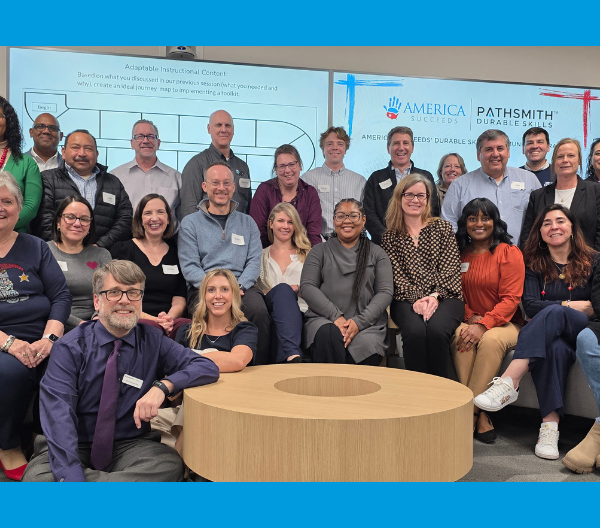When we think of a “research project,” our minds often go to what’s being studied. Yet, understanding the people behind the research and their motivations provides a context that can foster transparency and inspiration.
In today’s blog, we invite you to meet the dedicated team driving the Research Practice Collaborative (RPC) forward over the next 1.5 years, focused on enhancing education systems for all learners. Join us as we delve into their expertise, memorable moments, challenges, and aspirations.
A Dynamic and Dedicated Team
Michael Crawford, PhD, and Aidan Schief are the America Succeeds team driving the RPC forward. Michael leads the project, facilitating collaboration with all involved, while aligning its objectives with America Succeeds’ broader mission. Aidan supports the research efforts by contributing to planning sessions, conducting literature reviews on factors influencing durable skills development in K-12 education, and facilitating RPC communications.
Dr. Chris Unger and Dr. Michael (Mike) Dean of Northeastern University, each having more than 20 years of experience in educational research, serve as lead advisors for the RPC. Specializing in innovative, learner-centered programs and practices, Chris contributes to conceptualizing and co-designing the research initiative. With expertise in psychometrics and quantitative research methods, Mike supervised the survey and interview processes, and guided data analysis.
Together, this team brings diverse perspectives, interests, and experiences, driven by a shared commitment to unraveling the factors influencing student learning and achievement.
Turning Ideas and Values into Action
Like many ambitious endeavors, the RPC commenced with intensive brainstorming sessions. In Fall 2023, the America Succeeds team enlisted the expertise of Chris Unger and Mike Dean to chart a course toward addressing a crucial question: how can durable skills be effectively cultivated in K-12 education? This phase involved numerous Zoom calls and meticulous planning, complete with timelines, roles, responsibilities, and envisioned outcomes. Throughout this process, two fundamental principles emerged to guide their exploration.
Firstly, they prioritized the diversity of schools and programs. “Given the prevalence of progressive skills development models across the United States, our aim was to select a mix of schools that spanned geographical and demographic spectrums, including urban, suburban, and rural areas, and utilized diverse methods for cultivating students’ durable skills,” Aidan explained. This approach ensured engagement with a range of students within each program, capturing practices beneficial to a wide array of administrators, educators, and learners.
Secondly, influenced by Chris’ expertise, the team adopted a collaborative approach centered on mutual learning. Rather than conducting research on participants, they actively engaged with individuals who shared a mutual interest in exploring the factors that shape students’ lives through collaborative learning.
Favorite Moments: The Unexpected and Inspiring
The research team’s favorite moments have undoubtedly been working directly with students and educators in the four schools participating in Phase 1. “There have been so many moments where a student has told us about their confidence in speaking or confidence in taking initiative that changed significantly as a result of their participation in the program or schools we visited,” Chris noted.
Michael found inspiration in the innovative educational approaches that defy conventional norms, tailored to each school’s unique context. Each program creatively tackled challenges and met specific needs, fostering more cohesive and empowering learning environments.
Engaging with the alumni from the programs has also been eye-opening, as they consistently underscored how their experiences in skills-based, learner-centered programs profoundly shaped their educational and professional trajectories. Echoing Robert Frost’s metaphor of the diverging paths, alumni expressed how these environments empowered them to pursue their passions and seize opportunities, greatly impacting their achievements beyond secondary education.
Overcoming The Biggest Challenge Yet
The RPC hasn’t been without its challenges. One of the most significant hurdles identified by the research team is effectively assessing the ongoing development of learners’ durable skills. Interactions with participating schools have yielded invaluable insights into their approaches. The team is particularly focused on ensuring that assessments of durable skills development are grounded in authentic activities rather than relying on standardized instruments that merely approximate skill levels.
Addressing this challenge involves exploring diverse methodologies, including how schools and programs assess, document, and monitor skill development among their learners. It’s a complex task, but the team is actively pursuing multiple approaches to better understand what works, where, how, and for whom.
Looking Ahead: Our Excitement and Vision
Phase 1 of the RPC has unveiled compelling insights that our team eagerly anticipates exploring further. Looking ahead, the team is particularly excited about:
- Phase 2 of the RPC, which will expand the number of schools/programs included and will have a particular emphasis on exploring various approaches to evidence of learning.
- Cultivating a vibrant community of practice that embraces both trailblazing institutions and newcomers, fostering a dynamic network for sharing knowledge.
- Using findings to catalyze broader recognition and adoption of effective educational practices.
The RPC stands at the core of America Succeeds’ mission to define and promote high-quality durable skills development practices in K-12 education. The insights gained will shape our durable skills resources, establish best practices based on exemplary models, and cultivate impactful partnerships across schools and districts.
Curious about the discoveries from Phase 1 of the RPC? To stay informed, subscribe to our newsletter for updates about reports, tools, and more.




